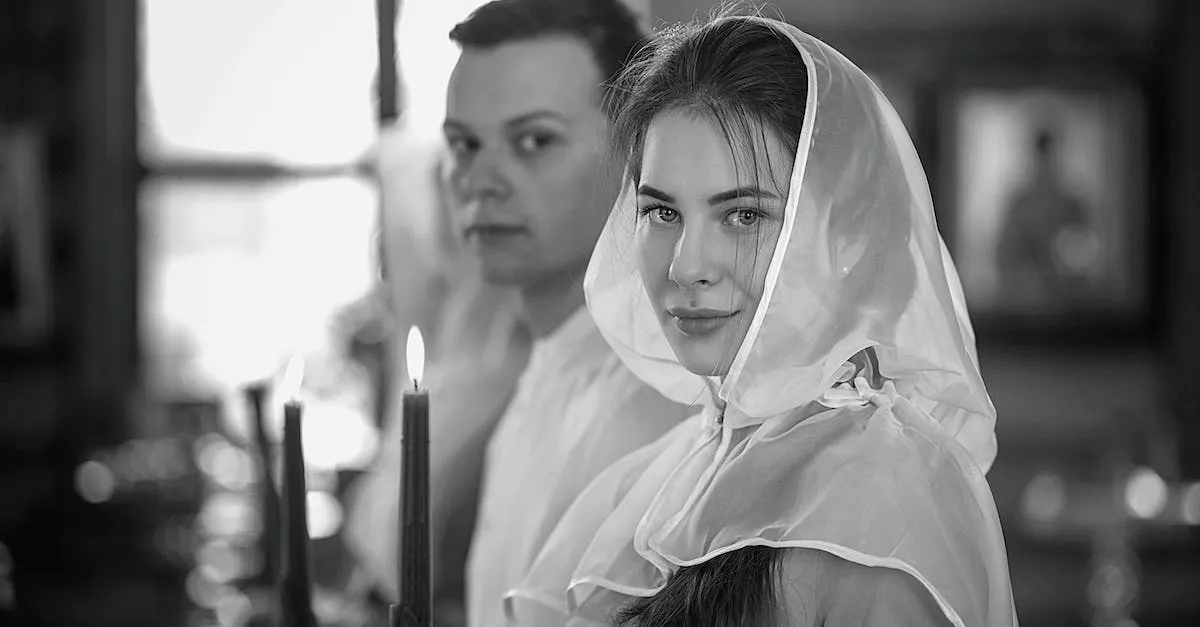Can A Christian Marry An Atheist? A Comprehensive Guide
Christianity and atheism – can these two worldviews unite in marriage? This question has puzzled many Christians who have fallen in love with non-believers. If you’re wondering whether it’s okay for a Christian to marry an atheist, you’ve come to the right place.
If you’re short on time, here’s a quick answer to your question: It is possible but challenging for a Christian to have a successful marriage with an atheist. Differences in beliefs about God, the afterlife, values, and child-rearing can put a strain on the relationship if not properly addressed.
In this comprehensive 3000-word guide, we will examine the key issues that Christian-atheist couples face, arguments for and against this type of marriage, advice for making it work, and alternatives to consider.
The Challenges of Marrying an Atheist
Marrying someone with different religious beliefs can present unique challenges. When a Christian decides to marry an atheist, they may encounter several obstacles that can potentially strain their relationship.
It is important to be aware of these challenges and find ways to navigate through them with respect and understanding.
Different Beliefs About God
One of the main challenges that arise in a marriage between a Christian and an atheist is their differing beliefs about the existence of God. Christians have a strong faith and belief in a higher power, while atheists reject the idea of God’s existence.
This fundamental difference in belief systems can lead to conflicts, debates, and a lack of understanding between partners.
Contrasting Views on Life After Death
Another area of disagreement between a Christian and an atheist is their contrasting views on what happens after death. Christians often believe in an afterlife and the concept of heaven and hell, while atheists may believe in the finality of death and the absence of an afterlife.
These divergent perspectives can cause tension and difficulty in finding common ground on this existential topic.
Conflicting Values and Morals
Christianity often comes with a set of moral values and principles based on religious teachings. These values may include beliefs about marriage, sexuality, and ethics. Atheists, on the other hand, may have a more secular or humanistic approach to morality.
The clash between these different value systems can lead to disagreements and challenges in finding common ground in decision-making and daily life.
Disagreement on Raising Children
One of the significant challenges that a Christian and an atheist couple may face is deciding how to raise their children. Christians may want to instill religious beliefs and practices in their children, while atheists may prefer a more secular upbringing.
This difference in approach can create tension and conflicts when it comes to making decisions about religious education, rituals, and involvement in religious communities.
It is crucial for couples facing these challenges to communicate openly and honestly with each other. They should respect each other’s beliefs and be willing to find compromises that work for both partners.
Seeking guidance from religious leaders, marriage counselors, or support groups can also be beneficial in navigating these challenges. Ultimately, successful marriages between a Christian and an atheist require mutual respect, understanding, and a commitment to finding common ground despite their differences in belief.
Reasons Some Christians Say Don’t Do It
Unequally Yoked
One of the primary reasons why some Christians advise against marrying an atheist is the concept of being “unequally yoked.” This phrase, derived from biblical teachings, suggests that believers and non-believers have fundamentally different worldviews and values.
Christians believe that marriage is not just a union of two individuals, but also a spiritual partnership. Therefore, entering into a marriage with someone who does not share the same faith can lead to potential conflicts and challenges.
Hard to Find Spiritual Intimacy
Another concern raised by Christians is the difficulty in establishing spiritual intimacy with an atheist spouse. For many believers, faith plays a central role in their lives, providing guidance, support, and a sense of purpose.
Sharing this aspect of life with a partner can deepen the bond and provide a strong foundation for the relationship. Without a shared belief system, it may be challenging to connect on a deeper spiritual level, which some Christians consider essential for a successful and fulfilling marriage.
Trials Are Harder to Endure
Marriage, like any relationship, has its fair share of trials and challenges. However, some Christians argue that facing these difficulties without a shared faith can make them even more challenging to endure.
When two individuals have differing perspectives on the meaning and purpose of life, it can be harder to find common ground and navigate through tough times. The absence of a shared faith can make it more challenging to draw strength, hope, and guidance from a higher power, which some Christians believe is crucial in overcoming marital challenges.
Risk of Children Rejecting Faith
For Christian couples considering marriage to an atheist, the potential impact on their children’s faith is often a significant concern. Many Christians desire to raise their children with a strong spiritual foundation and pass down their beliefs and values.
Marrying an atheist raises the possibility that their children may reject or question their faith, which can be deeply distressing for many devout believers.
It is important to note that these reasons reflect the perspective of some Christians and may not be universally held beliefs. Ultimately, the decision to marry an atheist or someone of a different faith is a personal one that should be made after careful consideration, open communication, and an understanding of the potential challenges that may arise.
Reasons It Could Work
While the decision to marry someone from a different religious background can be challenging, there are several reasons why a Christian and an atheist can make their relationship thrive. Here are some reasons why it could work:
Atheists Can Have Moral Values
Contrary to popular belief, atheists can have strong moral values. Just because someone does not believe in a higher power does not mean they lack a sense of right and wrong. In fact, many atheists base their moral compass on empathy, rationality, and the well-being of others.
This means that even though they may not share the same religious beliefs as their Christian partner, they can still possess similar values and principles.
Opportunity to Witness
Being in a relationship with an atheist can provide Christians with a unique opportunity to witness their faith. Through their actions, love, and kindness, Christians can showcase the positive impact that their beliefs have on their lives.
This can lead to meaningful discussions and a deeper understanding of each other’s perspectives. It is important to approach these conversations with respect and openness, creating a safe space for both partners to express their thoughts and beliefs.
Marriage More Than Beliefs
Marriage is about more than just shared beliefs. It involves a deep emotional connection, shared values, and a commitment to supporting each other through life’s challenges. While religious beliefs can play a significant role in a person’s identity, they are not the sole determining factor of a successful marriage.
A Christian and an atheist can still have a strong foundation built on love, trust, and mutual respect for each other’s differences.
Kids Can Decide Own Beliefs
If the couple decides to have children, it is important to remember that children have the capacity to form their own beliefs and make their own choices. Exposing them to both Christianity and atheism can provide them with a well-rounded understanding of different perspectives.
It is essential for parents to maintain open and honest communication, allowing their children to explore and decide their own beliefs as they grow older.
It is worth noting that every relationship is unique, and what works for one couple may not work for another. Each person must carefully consider their own beliefs, values, and priorities before entering into a mixed-faith marriage.
Seeking guidance from trusted religious leaders or counselors can also be beneficial in navigating the intricacies of such a relationship.
Keys to Making It Work
When it comes to a Christian marrying an atheist, there are several keys to making the relationship work. It requires open communication, mutual respect, and a willingness to navigate the challenges that may arise due to differing beliefs. Here are some important factors to consider:
Establish Shared Values
While the couple may have different religious beliefs, it is crucial to establish shared values that form the foundation of the relationship. These shared values can include principles such as honesty, respect, and compassion.
By focusing on the common ground, the couple can build a strong bond that goes beyond religious differences.
Compromise on Church Attendance
Attending church is an important aspect of the Christian faith, but it may not hold the same significance for an atheist partner. In such cases, it is essential to find a compromise that respects both individuals’ beliefs.
This could mean attending church alone, finding a middle ground by attending on special occasions, or exploring alternative spiritual practices that resonate with both partners.
Allow Open Discussion
An open and respectful dialogue about each other’s beliefs is crucial in any interfaith relationship. It is important to create a safe space where both partners can freely express their thoughts and concerns without judgment.
This open discussion can lead to a better understanding of each other’s perspectives and foster empathy and acceptance.
Agree How to Raise Kids
If the couple decides to have children, it is essential to have a clear plan on how to raise them regarding religion. This may involve deciding on whether the children will be exposed to religious teachings, attending church or any other relevant practices.
It is important to find a middle ground that respects both parents’ beliefs while allowing the children to explore and make their own choices as they grow older.
Seek Outside Support
Navigating the complexities of an interfaith relationship can be challenging, and seeking outside support can be immensely helpful. This could involve attending couples counseling or seeking guidance from religious leaders, family, or friends who have experience in interfaith relationships.
Their insights and advice can provide valuable perspectives and strategies for overcoming any obstacles that may arise.
Making a Christian-atheist marriage work requires patience, understanding, and a commitment to love and respect each other despite religious differences. By following these keys, couples can create a strong and harmonious relationship that can withstand the challenges that arise from differing beliefs.
Alternatives to Consider
When it comes to the question of whether a Christian can marry an atheist, there are several alternatives to consider. Each option presents its own set of challenges and considerations, so it’s important to carefully think through your choices before making a decision.
Date Only Christians
One alternative to consider is to exclusively date fellow Christians. By limiting your dating pool to those who share your faith, you can avoid potential conflicts and differences in beliefs that may arise in a relationship with an atheist.
Dating someone with similar religious beliefs can provide a strong foundation for a successful marriage.
Convert Partner Before Marriage
Another alternative is to encourage your atheist partner to explore Christianity and potentially convert before marriage. This approach requires open and honest communication, as well as a willingness to patiently discuss and explore matters of faith.
It’s important to remember that conversion should be a personal choice, and it’s crucial to respect your partner’s beliefs and decisions.
Focus on Finding The One
Instead of focusing on religious differences, some couples choose to prioritize finding a partner who shares their core values, morals, and life goals. While faith can be an important aspect of a relationship, it is not the sole determining factor of compatibility.
By focusing on shared values and goals, couples can build a strong foundation for a successful and fulfilling marriage, regardless of religious differences.
Consider Living Together First
For some couples, living together before marriage can be an alternative to consider. This allows the couple to test their compatibility and navigate potential challenges that may arise due to religious differences.
It’s important to approach cohabitation with open and honest communication, as well as a willingness to respect and understand each other’s beliefs. However, it’s worth noting that living together before marriage may not align with certain religious beliefs and traditions.
Remember, every relationship is unique, and what works for one couple may not work for another. It’s important to have open and honest conversations with your partner, seek guidance from trusted religious leaders or counselors, and ultimately make a decision that aligns with your values and beliefs.
Conclusion
In the end, whether a Christian can marry an atheist comes down to the individuals involved and their commitment to making it work. With open communication, compromise and respect for each other’s differences, Christian-atheist relationships are possible.
However, both parties should thoughtfully reflect on the challenges before making this life-long commitment to each other.








